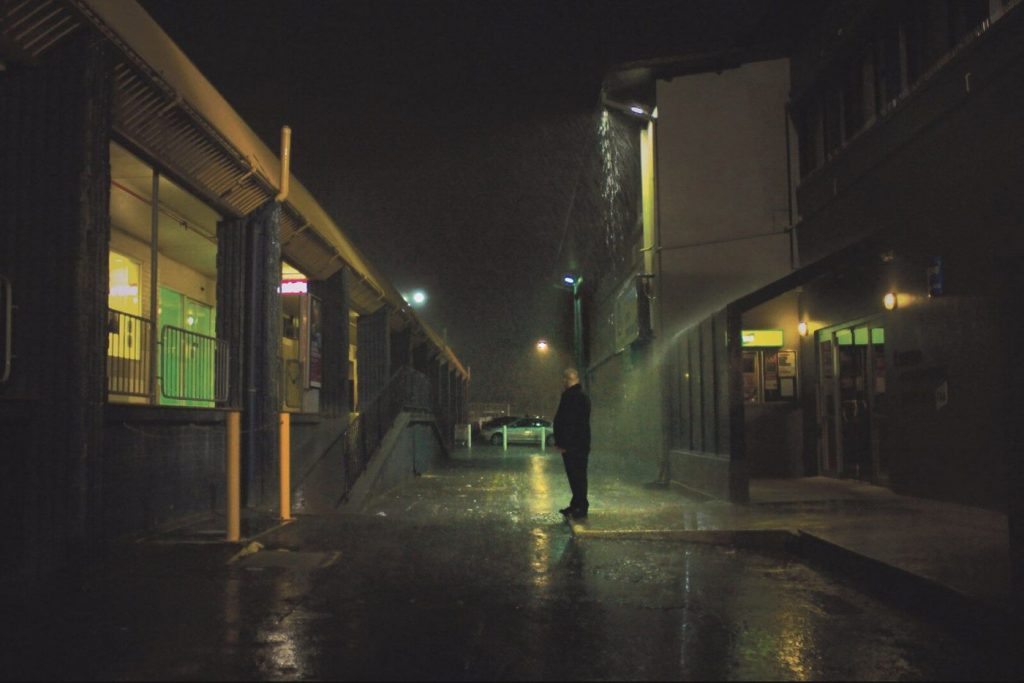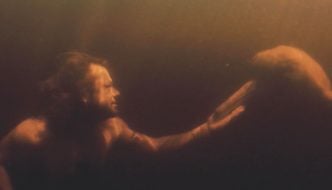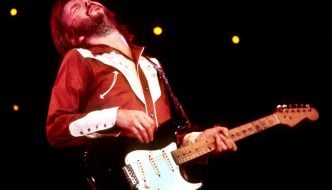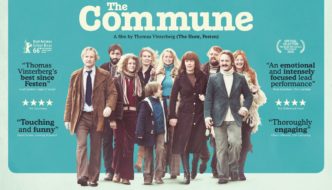Ghosthunter is a documentary following the story of security guard and ‘ghosthunter’ Jason King. King is a ‘ghosthunter’ both literally, as a free for hire paranormal investigator, and figuratively, increasingly haunted by spirits from his hazy and forgotten past. The film is Ben Lawrence’s first feature-film documentary and premiered at this year’s Sheffield Documentary Festival. Sian Ellis talks to him to talk about the making of the film.
In the first scene of the film we hear that you contacted the documentary’s central character Jason to make a film based on his Ghosthunting advert you had seen in the paper, but then the direction that the film takes after this is quite dramatically different from this original premise. What was the film you intended to make, and what was it about Jason’s ad that drew you in as a filmmaker?
All I knew about Jason was from that article, which basically said he was a ghosthunter — which in itself intrigued me — and that his brother had died, and he had seen his brother’s ghost. That was a really original hook for me in terms of just a story and a character and how he got into ghosthunting. Not being a fan of the paranormal, I thought it was just a story about grief and that was enough to contact him. But when I met Jason straight off the bat I thought there was even more to the story.
Did you ever envision that you would be making this film for as long as you were?
No I didn’t, and I don’t think you ever do. As things came to light it kept me intrigued and I kept wanting to tell his story. The other thing that became really important was that I felt he disclosed something to me that he hadn’t otherwise disclosed to other people and so the responsibility that came with that was very important to me. Then as others came to light and disclosed to me too the weight of that became important to honour, and by that point I was pretty committed to see it out. Jason got put into some pretty bad situations throughout it and I never felt it was right to leave the story, to leave him. I didn’t know whether that ending was going to reveal itself, and so a natural point where the film ends is a natural point where our relationship moved out of that chapter.
You mention a heavy sense of responsibility towards Jason and to others in the film. Did you ever worry that helping Jason to find his father wasn’t the right thing to do given the circumstances?
I found out pretty quickly that Jason was a vulnerable person, so the duty of care towards him was very high. Many people said don’t tell this story — people who were close to Jason like his family in the early days and also psychologists that I sought out to get advice on how to handle the situation. A lot of them said, “Stay out of it, don’t do what you are going to do”, because there were so many triggering moments for Jason. It’s explicitly said in the film to Jason if he really wants to find out what he’s looking for he was determined. As were the other survivors that reveal themselves during the film who were determined to take it through to the end, whether or not that was a piece of information or a confrontation with his father, or some form of justice they had as a vision for the end of their journey. I wanted to go along with them to that point because they knew where they were comfortable with their end point being.

It clearly must have been a tough film to make for yourself as well. If you had known it was going to be like that in the beginning would you still have made the film?
People ask me if I was ever considering stopping filming, but the question for me was always, ‘How do I get through this? How do I navigate through this in the safest possible way?’ I loved making it, I loved the people, and I hope that affection comes across. I have a really strong affection for the city of Sydney where I grew up. I felt really blessed that something like this was being presented and it was a story that I could tell and it was also an outlet for some of the characters. It probably became more important to them than to me in a way because it offered an outlet for what is otherwise a tragic set of circumstances in their life. It was the positive side of it so in that part that also kept me going as well.
I don’t think I’ll ever do a documentary like Ghosthunter again. The commitment, and the time. Maybe I will. I don’t know but I feel like it was a unique moment in time in someone’s life and I happened to be there at the right time, so that rarely comes along. I feel pretty good to have survived it.
You actually feature in the film yourself and you are obviously close to the characters. Do you feel like that changed the direction of the film as you were making it?
Ideally I wouldn’t have put myself in the film, and some people think that it was the wrong decision that I did. It was probably the hardest decision. I never set out to do that and, even though I really admire film makers that do that and I love films that do that, I didn’t see myself in that light. I don’t think that I would do it again, but I did feel like I had become such a key practical part of the storytelling, and there was so much happening off camera that I couldn’t tell the story without injecting myself into it.
I thought it was the right choice as it showed how much the people making the film cared about the people in it. Otherwise you potentially have that doubt about how much is a purely voyeuristic experience.
There was so much silence around this issue of these people dealing with childhood trauma and there were so many people that didn’t want to talk to me. But with Jason and the way that he communicates also it became necessary for me to be that person that he would bounce so much off and for me to be that person but behind the camera for that whole film probably wouldn’t have been fair to him or the audience.
In terms of silence there is a noticeable absence in the film of the voices of Jason’s ex-partners. What was the reason for this?
Mostly they didn’t want to engage. Whether or not you are on the periphery of someone who has suffered childhood trauma people generally don’t want to talk about it, and if you’re a victim you generally don’t want to talk about it.
There are several points in the film that indicate that maybe Jason isn’t the man he is presenting himself on camera to be. What was your relationship with him like?
Jason still puzzles me and that was partly what kept me going as I wanted to find out who he was. He would also say that he wanted to find out who he was and in unlocking and finding out about his childhood he felt that there were some answers about who he was now. I think that’s a common story. Our relationship, as with all the characters but with Jason in particular, I would describe it as a friendship but it was and it wasn’t because you don’t turn up to your friend’s house with a camera when their house has burnt down. In some ways it’s more intense and in some ways it’s not, so it’s unique, and I think that anyone who has made a film about someone will relate to that.
Were there ever moments where the relationship was strained or that you were worried that he’s maybe not being sincere in the things that he is saying?
Yeah I knew there was more to him and there was more to his story. I don’t think he was being deceptive, but I think he was struggling with what his story was and who he should present to be. I also think probably behind the scenes he was wondering who he was to himself. So this idea of identity and trying to find him was really the search we went on to answer those questions. I don’t think I’ve answered the questions about him that I started with and I probably can’t even remember what those were but I certainly haven’t found out. Maybe he will always remain a mystery.
Visit https://sheffdocfest.com/ for more information on Sheffield Doc Fest, the UK’s biggest documentary festival.
Filed under: Film, TV & Tech
Tagged with: Ben Lawrence, documentary, Ghosthunter, paranormal investigator, Sheffield Doc Fest, Sheffield International Documentary Festival, SIDF



Comments